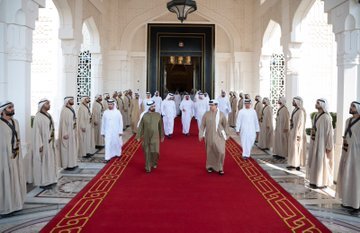Prime Minister and Ruler of Dubai, Sheikh Mohammed bin Rashid, has set out the five key priorities of the UAE for the new year during the first cabinet meeting in 2023. Sheikh Mohammed, who also serves as the Vice President, has said that the Emirates will focus on consolidating its national identity; developing the education sector; championing the environment and sustainability, boosting Emiratisation policies, and expanding economic partnerships around the globe.
The Dubai Ruler has hailed the progress of the nation during 2022 and is looking forward to fulfilling its ambitions in the coming twelve months. The ruler said that they have five government priorities for 2023, which have been mentioned above and were approved on January 2 in the Council of Ministers.
Sheikh Mohammed further said that the UAE is one of the most adaptable governments in the world. The outcome of 2022 has been reviewed. More than 900 decisions have been issued by the Cabinet. A total of 22 government policies were developed and approved. 68 federal laws were revised and issued, and 113 national regulatory regulations were drafted, approved, and implemented.
International agreements were approved and signed in 2022, which is preparing the UAE’s economic, infrastructure, social, and digital sectors for the next stage. In the year 2022, the government has formed more than 120 teams comprised of 110 federal and local authorities and 50 private sector agencies to work on updating more than 100 federal economic, social, educational, and regulatory laws in order to keep up with the many changes that have occurred in the country and around the world.
Some new strategies were given the go-ahead for the year 2023. During the meeting, the ministers approved the National Desertification Strategy, which will guide efforts to protect the country’s natural resources until 2030.The framework includes 33 initiatives that are aiming to preserve ecosystems, improve the condition of arid and drylands, and mitigate the impact of climate change.
Desertification involves human-caused degradation of the land in areas of low rainfall. The cabinet also agreed to regulate permit activities related to space in order to support the thriving sectors and revitalise investments.The cabinet has also approved the issuance of the decision to ensure compensation for the damage that is caused to third parties during the activities of the space. It has further approved the issuance of the decision to regulate the activities of the space resource in line with the objectives of the national space policy. The cabinet has further rolled out plans to measure public satisfaction with government services.
The reformation of the Emirates Council for Food Security has also been approved, and it has authorized a unified financial procedures guide for money transfers and donations outside the country. The cabinet has further given the green light to the issuance of a federal decree that would ratify the cooperation agreements with the governments of Serbia, Italy, the Ivory Coast, and Samoa.









